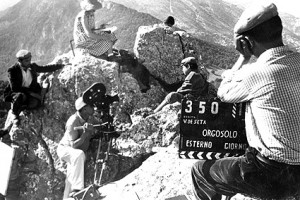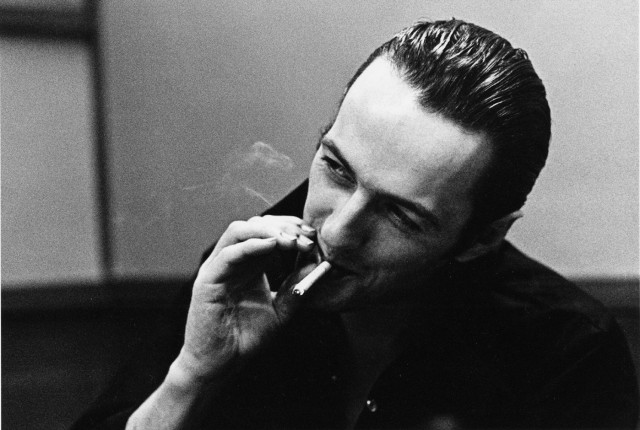
Joe Strummer documentary is part of Julien Temple sidebar at “Sound + Vision” series at Lincoln Center
I WAS THERE: THE MUSIC DOCS OF JULIEN TEMPLE — JOE STRUMMER: THE FUTURE IS UNWRITTEN (Julien Temple, 2007)
Film Society of Lincoln Center, Walter Reade Theater
165 West 65th St. between Eighth Ave. & Broadway
Saturday, August 1, 3:30
Festival runs July 29 – August 7
212-875-5050
www.filmlinc.com
www.joestrummerthemovie.com
 Director Julien Temple, who has made two outstanding documentaries about the Sex Pistols (The Great Rock and Roll Swindle and The Filth and the Fury), turns his camera on Joe Strummer of the British punk group the Clash in The Future Is Unwritten. Temple collects remarkable home movies of Strummer, from his early days as young John Mellor, a career diplomat’s son, through his time as the leader of one of the most famous and controversial bands in the world and his death at the age of fifty from a congenital heart defect. Strummer’s friends and family gather around a campfire in Brooklyn’s Empire St.-Fulton Ferry Park and talk about Strummer’s life and career, sharing keen insight in a format that the musician loved; his campfire get-togethers came to be known as Strummerville, a place for people to assemble and discuss life, art, and anything else that came to mind. Temple adds lots of footage of the Clash in action, as well as clips from Strummer’s earlier band, the 101ers, made up of squatters fighting the power, and his last band, the Mescaleros. Temple also brings some of Strummer’s drawings to life, animating them in humorous ways. Strummer essentially narrates the film himself, as Temple includes audio excerpts from Strummer’s “Last Call” radio show and interviews he gave over the years. Temple, a close friend of Strummer’s, paints a fascinating portrait of the complex man, featuring stories from the likes of Bono, Johnny Depp, Flea, Mele Mel, Courtney Love Cobain, Martin Scorsese, Steve Jones, John Cusack, Matt Dillon, Steve Buscemi, Damien Hirst, Roland Gift, Don Letts, Mick Jones, and many others. And there’s lots of music as well, of course, including several versions of “White Riot.” The Future Is Unwritten is screening August 1 at 3:30 in the “I Was There: The Music Docs of Julien Temple” sidebar of Lincoln Center’s annual “Sound + Vision” series, which also includes The Filth and the Fury, The Clash: New Year’s Day ’77, Dave Davies: Kinkdom Come, Ray Davies: Imaginary Man, Glastonbury, Never Mind the Baubles: Christmas with the Sex Pistols, and The Liberty of Norton Folgate, with Temple on hand for various introductions and Q&As.
Director Julien Temple, who has made two outstanding documentaries about the Sex Pistols (The Great Rock and Roll Swindle and The Filth and the Fury), turns his camera on Joe Strummer of the British punk group the Clash in The Future Is Unwritten. Temple collects remarkable home movies of Strummer, from his early days as young John Mellor, a career diplomat’s son, through his time as the leader of one of the most famous and controversial bands in the world and his death at the age of fifty from a congenital heart defect. Strummer’s friends and family gather around a campfire in Brooklyn’s Empire St.-Fulton Ferry Park and talk about Strummer’s life and career, sharing keen insight in a format that the musician loved; his campfire get-togethers came to be known as Strummerville, a place for people to assemble and discuss life, art, and anything else that came to mind. Temple adds lots of footage of the Clash in action, as well as clips from Strummer’s earlier band, the 101ers, made up of squatters fighting the power, and his last band, the Mescaleros. Temple also brings some of Strummer’s drawings to life, animating them in humorous ways. Strummer essentially narrates the film himself, as Temple includes audio excerpts from Strummer’s “Last Call” radio show and interviews he gave over the years. Temple, a close friend of Strummer’s, paints a fascinating portrait of the complex man, featuring stories from the likes of Bono, Johnny Depp, Flea, Mele Mel, Courtney Love Cobain, Martin Scorsese, Steve Jones, John Cusack, Matt Dillon, Steve Buscemi, Damien Hirst, Roland Gift, Don Letts, Mick Jones, and many others. And there’s lots of music as well, of course, including several versions of “White Riot.” The Future Is Unwritten is screening August 1 at 3:30 in the “I Was There: The Music Docs of Julien Temple” sidebar of Lincoln Center’s annual “Sound + Vision” series, which also includes The Filth and the Fury, The Clash: New Year’s Day ’77, Dave Davies: Kinkdom Come, Ray Davies: Imaginary Man, Glastonbury, Never Mind the Baubles: Christmas with the Sex Pistols, and The Liberty of Norton Folgate, with Temple on hand for various introductions and Q&As.
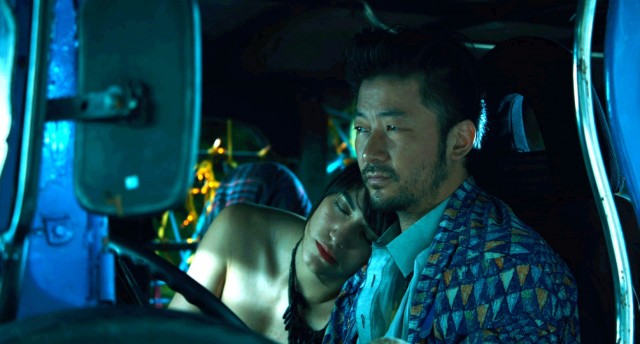
 If you’re in the mood for something very different at the fourteenth annual New York Asian Film Festival, look no further than Khavn de la Cruz’s Ruined Heart: Another Love Story Between a Criminal & a Whore. Expanding his fifteen-minute 2012 short, Khavn has created a visually arresting film that weaves its way through the gritty streets of an almost postapocalyptic Manila slum bursting with flashes of red, yellow, blue, and green. Using virtually no dialogue — the only words are from occasional poetry and several songs, and the very few times that characters speak, no translation is offered — Khavn tells the story of a Criminal (Japanese star Tadanobu Asano) on the run with a Whore (Mexican actress Nathalia Acevedo), attempting to get away from the Godfather (Filipino poet and playwright Vim Nadera). The multinational cast also includes the Friend (Andrew Puertollano) and the Lover (Russian-born actress Elena Kazan, who grew up in Berlin and now lives in Mumbai), but the real stars are Khavn’s mesmerizing score, Frances Grace Mortel’s art direction, Frances Soeder’s production design, Carlo Francisco Manatad’s frantic editing, and Christopher Doyle’s dizzying cinematography, which at times has Asano doing the camerawork himself as he runs through small passageways and back alleys.
If you’re in the mood for something very different at the fourteenth annual New York Asian Film Festival, look no further than Khavn de la Cruz’s Ruined Heart: Another Love Story Between a Criminal & a Whore. Expanding his fifteen-minute 2012 short, Khavn has created a visually arresting film that weaves its way through the gritty streets of an almost postapocalyptic Manila slum bursting with flashes of red, yellow, blue, and green. Using virtually no dialogue — the only words are from occasional poetry and several songs, and the very few times that characters speak, no translation is offered — Khavn tells the story of a Criminal (Japanese star Tadanobu Asano) on the run with a Whore (Mexican actress Nathalia Acevedo), attempting to get away from the Godfather (Filipino poet and playwright Vim Nadera). The multinational cast also includes the Friend (Andrew Puertollano) and the Lover (Russian-born actress Elena Kazan, who grew up in Berlin and now lives in Mumbai), but the real stars are Khavn’s mesmerizing score, Frances Grace Mortel’s art direction, Frances Soeder’s production design, Carlo Francisco Manatad’s frantic editing, and Christopher Doyle’s dizzying cinematography, which at times has Asano doing the camerawork himself as he runs through small passageways and back alleys.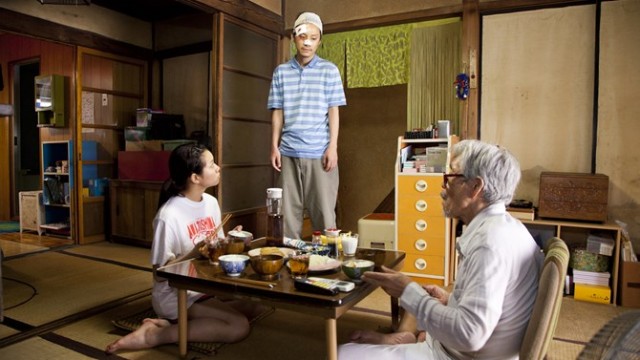
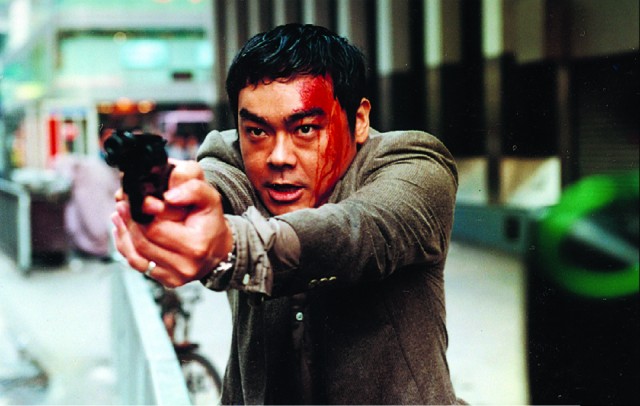
 The fourteenth annual New York Asian Film Festival is saluting legendary Hong Kong director Ringo Lam, presenting him with the Lifetime Achievement Award. Lam, who turns sixty this year, will be at Lincoln Center for screenings of two of his works, City on Fire on June 27 and Full Alert on June 28. In the latter, Lam’s follow-up to his disappointing Hollywood debut, the Jean-Claude Van Damme vehicle Maximum Risk, Lau Ching-wan stars as Officer Pao, a member of Hong Kong’s Special Crime Bureau who becomes involved in a case that turns deeply personal. After arresting explosives expert Mak Kwan (Francis Ng) for the brutal murder of an architect, Pao is determined to find the rest of Mak’s Taiwanese crew, which is led by mainland boss Jie (Jack Gao), and prevent the robbery of a mysterious vault. Pao and his team track Mak’s girlfriend, Chung Lai Hung (Amanda Lee), who knows more than she’s letting on, while Pao and Mak become immersed in a tense, psychological game of cat and mouse, exploring what it feels like to kill someone. There are numerous incredulous plot twists and a rather lame car chase, but the guerrilla filmmaking style of Lam and cinematographer Ardy Lam, ranging through the streets of a Hong Kong about to be handed over from the British to the Chinese, is supremely effective, as are the lead performances by Lau and Ng, evoking the relationships portrayed earlier by Robert De Niro and Al Pacino in Michael Mann’s Heat and later by Andy Lau and Tony Leung in Andrew Lau and Alan Mak’s Infernal Affairs. The use of mobile phones and surveillance technology feels much older than 1997, displaying how far we have come so fast. Lam saves the heavy violence for the spectacular finale, letting the emotions build before exploding. Nominated for five Hong Kong Film Awards, including Best Film, Best Director, and Best Actor (Lau), Full Alert is screening at the Walter Reade Theater on June 28 at 2:00, with Lam on hand to introduce it. The New York Asian Film Festival continues at Lincoln Center through July 6 with more than three dozen new and old films from China, Korea, Japan, the Philippines, Cambodia, and other Southeast Asian countries, including Sabu’s Chasuke’s Journey, Kinji Fukasuku’s Battles without Honor and Humanity, Im Sang-soo’s The President’s Last Bang, Wang Xiaoshuai’s Red Amnesia, Im Kwon-taek’s Revivre, and Sion Sono’s Tokyo Tribe.
The fourteenth annual New York Asian Film Festival is saluting legendary Hong Kong director Ringo Lam, presenting him with the Lifetime Achievement Award. Lam, who turns sixty this year, will be at Lincoln Center for screenings of two of his works, City on Fire on June 27 and Full Alert on June 28. In the latter, Lam’s follow-up to his disappointing Hollywood debut, the Jean-Claude Van Damme vehicle Maximum Risk, Lau Ching-wan stars as Officer Pao, a member of Hong Kong’s Special Crime Bureau who becomes involved in a case that turns deeply personal. After arresting explosives expert Mak Kwan (Francis Ng) for the brutal murder of an architect, Pao is determined to find the rest of Mak’s Taiwanese crew, which is led by mainland boss Jie (Jack Gao), and prevent the robbery of a mysterious vault. Pao and his team track Mak’s girlfriend, Chung Lai Hung (Amanda Lee), who knows more than she’s letting on, while Pao and Mak become immersed in a tense, psychological game of cat and mouse, exploring what it feels like to kill someone. There are numerous incredulous plot twists and a rather lame car chase, but the guerrilla filmmaking style of Lam and cinematographer Ardy Lam, ranging through the streets of a Hong Kong about to be handed over from the British to the Chinese, is supremely effective, as are the lead performances by Lau and Ng, evoking the relationships portrayed earlier by Robert De Niro and Al Pacino in Michael Mann’s Heat and later by Andy Lau and Tony Leung in Andrew Lau and Alan Mak’s Infernal Affairs. The use of mobile phones and surveillance technology feels much older than 1997, displaying how far we have come so fast. Lam saves the heavy violence for the spectacular finale, letting the emotions build before exploding. Nominated for five Hong Kong Film Awards, including Best Film, Best Director, and Best Actor (Lau), Full Alert is screening at the Walter Reade Theater on June 28 at 2:00, with Lam on hand to introduce it. The New York Asian Film Festival continues at Lincoln Center through July 6 with more than three dozen new and old films from China, Korea, Japan, the Philippines, Cambodia, and other Southeast Asian countries, including Sabu’s Chasuke’s Journey, Kinji Fukasuku’s Battles without Honor and Humanity, Im Sang-soo’s The President’s Last Bang, Wang Xiaoshuai’s Red Amnesia, Im Kwon-taek’s Revivre, and Sion Sono’s Tokyo Tribe.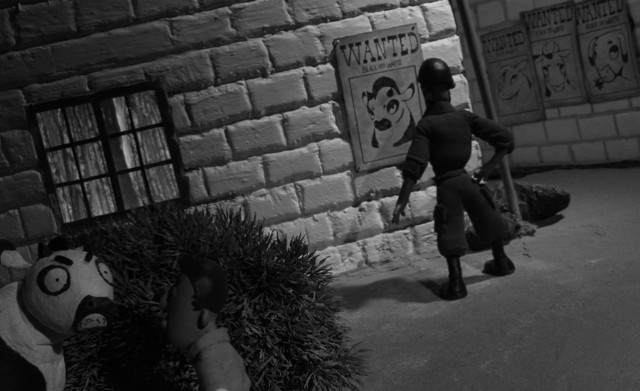
 The never-ending battle between Israel and the Palestinians is reduced to a single incident attempting to be a microcosm of the conflict in the relatively silly and uneven documentary The Wanted 18. In 1988, shortly after the first Intifada began, an Israeli kibbutz sold eighteen cows to the Palestinian town of Beit Sahour. As the small, tight-knit community rallied around the cows, seeing them as a crucial part to their goal of freedom and independence, the Israelis grew suspicious of the Palestinians’ growing self-sufficiency and declared the cows “a threat to the national security of the state of Israel.” Codirectors Amer Shomali, whose family came from Beit Sahour, and Canadian Paul Cowan (Going the Distance, Westray) tell the story of the fight over the cows through contemporary interviews, drawings, reenactments, archival footage, and stop-motion animation in which four of the cows share their thoughts on the matter: Rivka (voiced by Holly Uloth “O’Brien”), Ruth (Heidi Foss), Lola (casting director Rosann Nerenberg), and Goldie (Alison Darcy). The heavily one-sided tale delves into such issues as taxation, bigotry, boycotts, curfews, and civil disobedience, as people from Beit Sahour give first-person accounts of what happened, along with Ehud Zrahiya, who at the time was advisor to the Israeli military governor on Arab affairs. “We were concerned that Beit Sahour may become a model for other places,” Zrahiya admits. “We were certainly concerned that this might infect other places and would spread to other localities throughout the West Bank.”
The never-ending battle between Israel and the Palestinians is reduced to a single incident attempting to be a microcosm of the conflict in the relatively silly and uneven documentary The Wanted 18. In 1988, shortly after the first Intifada began, an Israeli kibbutz sold eighteen cows to the Palestinian town of Beit Sahour. As the small, tight-knit community rallied around the cows, seeing them as a crucial part to their goal of freedom and independence, the Israelis grew suspicious of the Palestinians’ growing self-sufficiency and declared the cows “a threat to the national security of the state of Israel.” Codirectors Amer Shomali, whose family came from Beit Sahour, and Canadian Paul Cowan (Going the Distance, Westray) tell the story of the fight over the cows through contemporary interviews, drawings, reenactments, archival footage, and stop-motion animation in which four of the cows share their thoughts on the matter: Rivka (voiced by Holly Uloth “O’Brien”), Ruth (Heidi Foss), Lola (casting director Rosann Nerenberg), and Goldie (Alison Darcy). The heavily one-sided tale delves into such issues as taxation, bigotry, boycotts, curfews, and civil disobedience, as people from Beit Sahour give first-person accounts of what happened, along with Ehud Zrahiya, who at the time was advisor to the Israeli military governor on Arab affairs. “We were concerned that Beit Sahour may become a model for other places,” Zrahiya admits. “We were certainly concerned that this might infect other places and would spread to other localities throughout the West Bank.”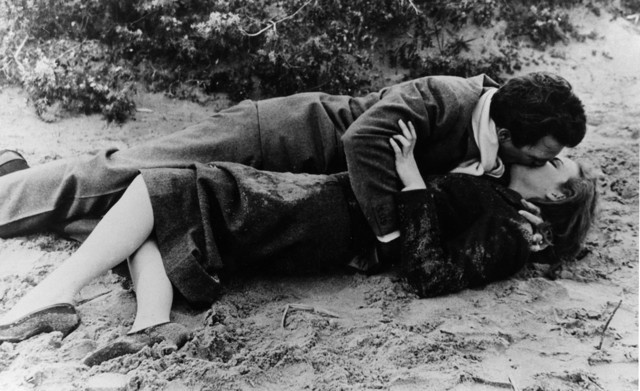
 Winner of the Silver Lion at the 1955 Venice Film Festival, Michelangelo Antonioni’s sublimely marvelous Le Amiche follows the life and loves of a group of oh-so-fabulous catty, chatty, and ultra-fashionable Italian women and the men they keep around for adornment. Returning to her native Turin after having lived in Rome for many years, Clelia (Eleonora Rossi Drago) discovers that the young woman in the hotel room next to hers, Rosetta (Madeleine Fischer), has attempted suicide, thrusting Clelia into the middle of a collection of self-centered girlfriends who make the shenanigans of George Cukor’s The Women look like child’s play. The leader of the vain, vapid vamps is Momina (Yvonne Furneaux), who carefully orchestrates situations to her liking, particularly when it comes to her husband and her various, ever-changing companions, primarily architect Cesare (Franco Fabrizi). As Rosetta falls for painter Lorenzo (Gabriele Ferzetti), who is married to ceramicist Nene (Valentina Cortese), Clelia considers a relationship with Cesare’s assistant, Carlo (Ettore Manni), and the flighty Mariella (Anna Maria Pancani) considers just about anyone. Based on the novella Tra Donne Sole (“Among Only Women”) by Cesare Pavese, Le Amiche is one of Antonioni’s best, and least well known, films, an intoxicating and thoroughly entertaining precursor to his early 1960s trilogy, L’Avventura, La Notte, and L’Eclisse. Skewering the not-very-discreet “charm” of the Italian bourgeoisie, Antonioni mixes razor-sharp dialogue with scenes of wonderful ennui, all shot in glorious black and white by Gianni Di Venanzo.
Winner of the Silver Lion at the 1955 Venice Film Festival, Michelangelo Antonioni’s sublimely marvelous Le Amiche follows the life and loves of a group of oh-so-fabulous catty, chatty, and ultra-fashionable Italian women and the men they keep around for adornment. Returning to her native Turin after having lived in Rome for many years, Clelia (Eleonora Rossi Drago) discovers that the young woman in the hotel room next to hers, Rosetta (Madeleine Fischer), has attempted suicide, thrusting Clelia into the middle of a collection of self-centered girlfriends who make the shenanigans of George Cukor’s The Women look like child’s play. The leader of the vain, vapid vamps is Momina (Yvonne Furneaux), who carefully orchestrates situations to her liking, particularly when it comes to her husband and her various, ever-changing companions, primarily architect Cesare (Franco Fabrizi). As Rosetta falls for painter Lorenzo (Gabriele Ferzetti), who is married to ceramicist Nene (Valentina Cortese), Clelia considers a relationship with Cesare’s assistant, Carlo (Ettore Manni), and the flighty Mariella (Anna Maria Pancani) considers just about anyone. Based on the novella Tra Donne Sole (“Among Only Women”) by Cesare Pavese, Le Amiche is one of Antonioni’s best, and least well known, films, an intoxicating and thoroughly entertaining precursor to his early 1960s trilogy, L’Avventura, La Notte, and L’Eclisse. Skewering the not-very-discreet “charm” of the Italian bourgeoisie, Antonioni mixes razor-sharp dialogue with scenes of wonderful ennui, all shot in glorious black and white by Gianni Di Venanzo.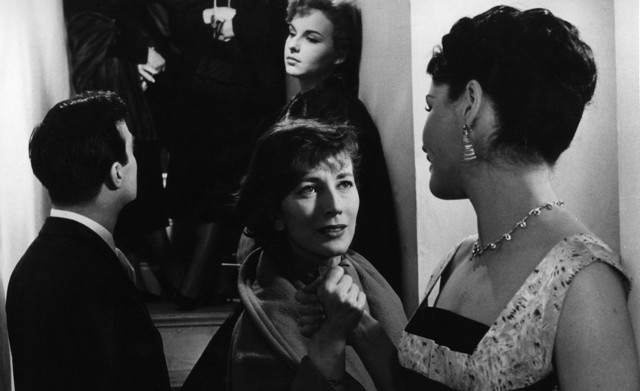
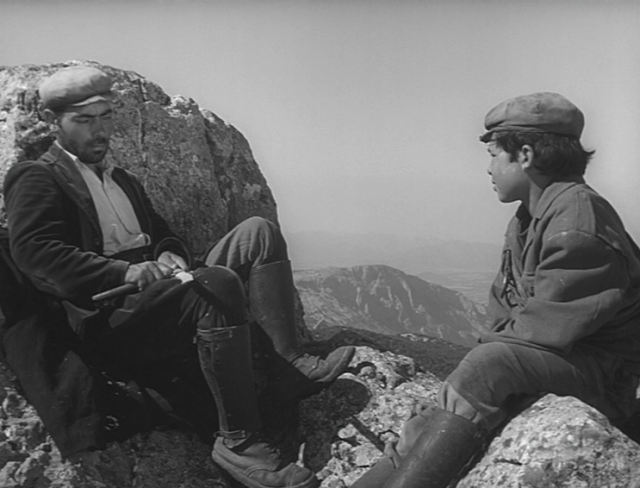
 “The souls of these men are still primitive. What is right according to their law is not right according to that of the modern world,” an unseen narrator explains at the beginning of Vittorio De Seta’s sadly overlooked debut feature, Banditi a Orgosolo, about shepherds scraping to get by in a vast mountainous region of Sardinia. In the black-and-white post-neorealist film, Michele (Michele Cossu) and his young brother, Peppeddu (Peppeddu Cuccu), tend to their flock of sheep, for which Michele still owes money. After a trio of former shepherds turned bandits shows up, Michele is visited by the police; not wanting to get involved, he lies to the carbinieri, insisting he has not seen anyone else. A firefight ensues between the police and the bandits, leaving one cop dead, and Michele and Peppeddu are on the lam, hunted by the police while desperately trying to hold on to their flock as they make their way through what Michele refers to as “bad places.” Winner of the New Cinema Award at the 1961 Venice Film Festival, Banditi a Orgosolo is a dark, bleak tale, shot by De Seta in nearly infinite gradations of black and white, Valentino Bucchi’s ominous score lurking in the background. Cossu, a nonprofessional actor from the region, portrays Michele with a stark earnestness and a clear understanding of the futility of his character’s situation. A former documentarian, De Seta (The Uninvited, Lettere dal Sahara), who wrote the screenplay with Vera Gherarducci, doesn’t make any epic proclamations about society’s ills, instead letting the story about changing times and abject poverty in Sardinia unfold at an often agonizing snail’s pace. The shepherds and their small villages, representative of the old ways, are being left behind, even as the state takes the place of centuries-old oppressors, doing what it can to keep them down and destitute.
“The souls of these men are still primitive. What is right according to their law is not right according to that of the modern world,” an unseen narrator explains at the beginning of Vittorio De Seta’s sadly overlooked debut feature, Banditi a Orgosolo, about shepherds scraping to get by in a vast mountainous region of Sardinia. In the black-and-white post-neorealist film, Michele (Michele Cossu) and his young brother, Peppeddu (Peppeddu Cuccu), tend to their flock of sheep, for which Michele still owes money. After a trio of former shepherds turned bandits shows up, Michele is visited by the police; not wanting to get involved, he lies to the carbinieri, insisting he has not seen anyone else. A firefight ensues between the police and the bandits, leaving one cop dead, and Michele and Peppeddu are on the lam, hunted by the police while desperately trying to hold on to their flock as they make their way through what Michele refers to as “bad places.” Winner of the New Cinema Award at the 1961 Venice Film Festival, Banditi a Orgosolo is a dark, bleak tale, shot by De Seta in nearly infinite gradations of black and white, Valentino Bucchi’s ominous score lurking in the background. Cossu, a nonprofessional actor from the region, portrays Michele with a stark earnestness and a clear understanding of the futility of his character’s situation. A former documentarian, De Seta (The Uninvited, Lettere dal Sahara), who wrote the screenplay with Vera Gherarducci, doesn’t make any epic proclamations about society’s ills, instead letting the story about changing times and abject poverty in Sardinia unfold at an often agonizing snail’s pace. The shepherds and their small villages, representative of the old ways, are being left behind, even as the state takes the place of centuries-old oppressors, doing what it can to keep them down and destitute.